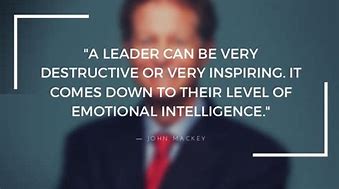EMOTIONAL INTELLIGENCE AND LEADERSHIP
 I have been reflecting on my life and in what does it mean to continue to grow, not to grow in only one dimension, but to grow comprehensively. Emotional intelligence is one dimension that I believe separates the great leader from the good ones. I am wondering if we, (as a church) are intentional enough about talking/teaching on emotional intelligence?
I have been reflecting on my life and in what does it mean to continue to grow, not to grow in only one dimension, but to grow comprehensively. Emotional intelligence is one dimension that I believe separates the great leader from the good ones. I am wondering if we, (as a church) are intentional enough about talking/teaching on emotional intelligence?
What does the Bible say about emotional intelligence, and what does it mean to be emotionally intelligent?
According to the Cambridge Business English dictionary, “emotional intelligence is the ability to understand and control your own feelings, and to understand the feelings of others and respond to them in a suitable way”. Emotional intelligence is not the suppression of emotions. It is rather the ability to comprehend the effects of your feelings. This is crucial for making sound, objective decisions when a leader’s pride and self-esteem are compromised. Let me take this further by saying, this is the place where the leader is comfortable in the discomfort of being wrong and makes space for the follower/other to be "right" and be comfortable in the "comfort" of being right.
The Bible, on the other hand, refers to discernment. This is the ability to obtain sharp perceptions or to judge well, and that is Godly wisdom. Wisdom can be found/asked from God. Solomon asked for wisdom when he said, “give me an understanding heart so that I can govern your people well and know the difference between right and wrong” (1st Kings 3:9).
In the New Testament, we are introduced to a young woman, whom I believe had a godly wisdom/emotional intelligence/discernment. Her name is Mary. The Bible tells us in the gospel of Luke 2; from verse 8-12 that "And there were shepherds living out in the fields nearby, keeping watch over their flocks at night. An angel of the Lord appeared to them, and the glory of the Lord shone around them, and they were terrified. But the angel said to them, “Do not be afraid. I bring you good news that will cause great joy for all the people. Today in the town of David a Savior has been born to you; he is the Messiah, the Lord. This will be a sign to you: You will find a baby wrapped in cloths and lying in a manger.”, The shepherds were told the above by the angels. They went to Bethlehem to see what was said. When they found exactly what the angels said to them, the Bible says in verse 18, the people “were amazed when the shepherd told them what the angel said to them.” Verse 19, on the other hand, says this, “but Mary treasured up all these things and pondered them in her heart”. If the above is not a sign of a Godly wisdom/discernment/ an emotionally matured young woman, I don't know what is. And I believe that I don't need to do any analysis of this verse, it communicates the heart of Mary as it is.
I am of the opinion that the greatest measure of the best leader is her/his level of emotional intelligence. It is my belief that emotional intelligence is as important if not more than academic intelligence. Our emotions are a very important part of who we are as human beings. They are a powerful tool to serve, not to manipulate, and emotions can also be a powerful tool to destroy each other. For example, the lack of emotional intelligence produces the following: insensitivity, coldness, thoughtlessness, selfishness, tactlessness, inconsiderateness, inattentiveness, etc. Who would want to be under that?
How did Jesus tackle this important dimension of His life? Let’s look at Jesus’s activities.
The woman at the well is but one of the great examples. I must acknowledge my biases in that this passage of John 4:1-26 is one of my favorites of the Bible. Those who are not familiar with the Bible, it is a well-known Bible passage. I will not write the whole 26 verses down, but I will highlight what I am going to emphasize.
Emotional intelligence of a leader enables her/him to break the societal walls. There were walls that Jesus had to break to get into the humanity of the Samaritan woman. One of those walls was the gender wall, (Jesus, a Jewish Rabbi speaks to a woman). Second wall, a racial wall, (Samaritans were despised by Jews because the Samaritans were--a mixed-race people.) For instance, the Bible says, “The woman was surprised, for Jews refuse to have anything to do with Samaritans” (John4:9). Breaking the wall in order to meet the other human being in his/her humanity, takes a very matured person emotionally. The reason I am saying this is because one cannot meet another human being in his/her humanity without your humanity being touched. Jesus knew and was okay with the fact that His own humanity will be exposed in the process of breaking the walls to enter in another human being's humanity.
And thirdly, Jesus exposed Himself by being vulnerable to the Samaritan woman by asking her for water,” Soon a Samaritan woman came to draw water, and Jesus said to her, “Please give me a drink.” (John 4:7). And that is the sign of emotional maturity. Jesus uncovers His humanity by revealing who He was to this woman and what His mission was to her. “The woman said, “I know the Messiah is coming—the one who is called Christ. When he comes, he will explain everything to us.” Then Jesus told her, “I am the Messiah!”, (John 4: 25-26) The point is, there was no way that Jesus could break those walls and His walls remain protected.
It goes without saying; this behavior of Jesus shocked the woman and liberated her.” The woman left her water jar beside the well and ran back to the village, telling everyone, ", (John 4:28). Who is now being vulnerable? Who is now aware of who she was? Who is now in touch with her emotions? This is evidence that one cannot meet/encounter this kind of leadership and remain the same. And the leader continues to grow as a result of continuously having to break the walls that are the barrier to meet the humanity of another person behind the walls.
Jesus, (not ONLY because He was God) as an emotionally cultivated leader, was aware/in touch with His emotional state, and therefore was in control and able to position Himself as a human being. As a result, He was able to meet another human being in a human/heart level. It takes an emotionally developed person to meet someone on that level and be comfortable. From the Christian Spiritual perspective, it takes the closeness and intimate relationship with God to grow emotionally. (Psalm 51:6) Surely You desire truth in the inmost being You teach me wisdom in the inmost place. One becomes a holistic individual who is available intellectually, spiritually and emotionally. A well-rounded leader who can find?




 Death is always something very far until it hits like lighting near you, suddenly it becomes very close. It is a perfectly normal cycle of life but there are two sides to the same coin. Death has beauty and there is the beast of it. Both of these sides are coming hand in hand with death and these sides cannot be separated from each other. They are the sides of the same coin. You do not get the beauty of death without the ugliness of it, or visa-versa. However, it depends on which side are you comfortable looking for. Death has a twin, and that twin is life.
Death is always something very far until it hits like lighting near you, suddenly it becomes very close. It is a perfectly normal cycle of life but there are two sides to the same coin. Death has beauty and there is the beast of it. Both of these sides are coming hand in hand with death and these sides cannot be separated from each other. They are the sides of the same coin. You do not get the beauty of death without the ugliness of it, or visa-versa. However, it depends on which side are you comfortable looking for. Death has a twin, and that twin is life.
 I have been reflecting on my life and in what does it mean to continue to grow, not to grow in only one dimension, but to grow comprehensively. Emotional intelligence is one dimension that I believe separates the great leader from the good ones. I am wondering if we, (as a church) are intentional enough about talking/teaching on emotional intelligence?
I have been reflecting on my life and in what does it mean to continue to grow, not to grow in only one dimension, but to grow comprehensively. Emotional intelligence is one dimension that I believe separates the great leader from the good ones. I am wondering if we, (as a church) are intentional enough about talking/teaching on emotional intelligence?